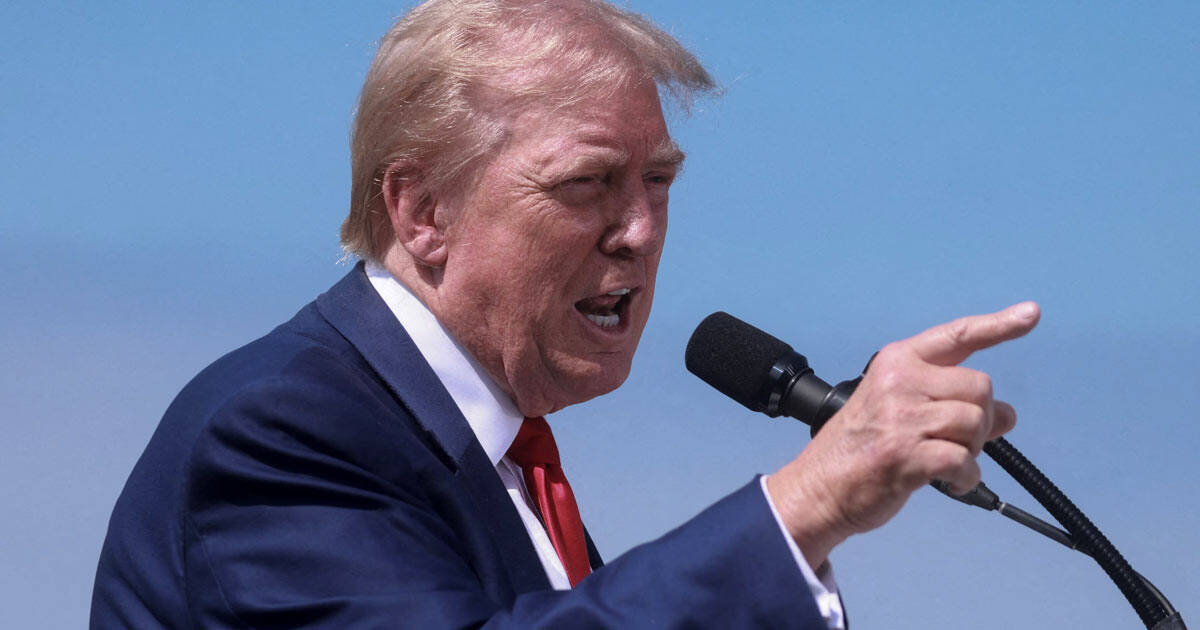President Donald Trump has ended the controversial program that allowed hundreds of thousands of foreign nationals to live legally in the United States.
On Friday, Trump announced that he would be revoking the Temporary Protected Status (TPS) parole program.
TPS was granted to over 500,000 non-citizens by former President Joe Biden.
The program provides legal residency, work permits, and a path to citizenship.
The revocation builds on previous efforts to strip TPS from millions of foreign nationals from countries like Haiti, Venezuela, and other nations.
Breaking: President Trump is revoking Temporary Protected Status (TPS) with deportations being allowed as early as next month.
Can I get a #DeportNow in the comments?
This involves approximately 530,000 people from Haiti, Cuba, Nicaragua, and Venezuela, which the Biden… pic.twitter.com/KIXy25fU3E
— Tom Homan – Border Czar Rapid MAGA News Reports (@TomHoman_) March 21, 2025
The Department of Homeland Security (DHS) released a notice confirming the termination of categorical parole programs for inadmissible aliens from Cuba, Haiti, and Nicaragua, as well as their immediate family members.
These parole programs were rapidly expanded under the Biden administration.
They had allowed foreign nationals from these countries to be directly flown into the U.S. and placed across the country.
Under the scheme, migrants bypassed the usual “asylum seeker” charade and were given legal alien status.
In many cases, the Biden administration transported the migrants into the U.S. on taxpayer-funded flights.
The Biden admin’s move to transport large numbers of foreign nationals under a program known as CHNV ended shortly after Trump assumed office in January.
Biden officials claimed that this program was designed to reduce illegal immigration at the Southern Border by providing direct access to the U.S. for “asylum seekers.”
However, the effectiveness of this program in reducing illegal immigration has been questioned.
Encounters at the Southern Border hit record highs under Biden but have plummeted under Trump, even without the parole program.
According to DHS, the foreign nationals affected by this termination—primarily Nicaraguan, Cuban, and Haitian nationals—will have their work permits and deportation protections revoked in late April, 30 days after March 25.
DHS has stated that it will seek to arrest and deport those who fail to depart the U.S. before the 30-day deadline.
Additionally, DHS clarified that it reserves the right to process foreign nationals who were previously protected by the program if they fail to leave by the deadline.
The agency further indicated that those who are prioritized for detention will be individuals who have not applied for another immigration status, such as asylum or a green card.
DHS is urging affected individuals to voluntarily self-deport using the CBP Home app.
The app, previously known as CBP One, was used during the Biden administration to schedule immigration.
However, the app has been reworked by the Trump admin to urge migrants to leave the country.
DHS spokesperson Tricia McLaughlin commented on the termination of the CHNV parole programs, criticizing the previous administration’s handling of the situation.
“The previous administration lied to America — they allowed more than half a million loosely vetted aliens from Cuba, Haiti, Nicaragua, and Venezuela and their immediate family members to enter the United States through these disastrous parole programs,” McLaughlin said.
“They granted them opportunities to compete for American jobs and undercut American workers, forced civil servants to promote the programs even when fraud was identified, and then blamed Republicans in Congress for the chaos that ensued and the crime that followed.”
McLaughlin went on to describe the termination of these programs as a return to “common-sense policies,” emphasizing public safety and a focus on “America First” principles.
The issue of TPS status has become a focal point during the 2024 presidential campaign, particularly after a crisis in Springfield, Ohio.
The small Ohio town of 40,000 residents gained national attention when over 20,000 Haitian migrants were resettled there by the Biden administration.
Local residents have raised concerns over increasing crime, including car accidents, and the strain on local services such as hospitals and schools, which have seen an influx of non-citizen residents.
Trump has previously moved to revoke TPS protections for over a million illegal aliens from countries including Haiti and Venezuela.
His administration has stressed that thorough vetting for TPS applicants in these nations is nearly impossible, adding to concerns about the potential risks of granting such status.
With the revocation of TPS for over 500,000 foreign nationals, Trump continues to tighten immigration policies, aiming to reduce the number of individuals benefiting from programs seen as vulnerable to exploitation.



Our comment section is restricted to members of the Slay News community only.
To join, create a free account HERE.
If you are already a member, log in HERE.